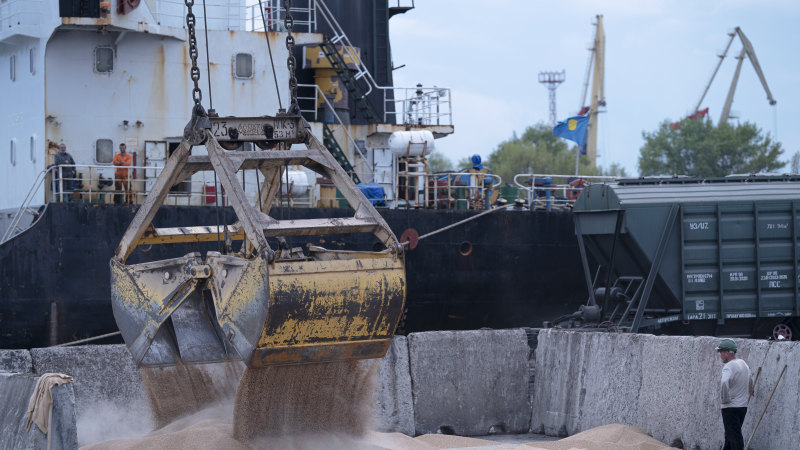Save articles for later
Add articles to your saved list and come back to them any time.
Key points
- Port hit on the Danube River opposite NATO-member Romania.
- Kyiv says aim is to intimidate shippers considering return.
- Zelensky said Moscow was intent on creating a “global catastrophe”.
- Moscow pulled out of a key grain deal in mid-July.
- Poland, Lithuania and Latvia are growing concerned about Wagner troops based in Belarus.
Kyiv: Russia attacked Ukraine’s main inland port across the Danube River from Romania on Wednesday, sending global food prices higher as it ramps up its use of force to prevent Ukraine from exporting grain.
The attacks destroyed buildings in the port of Izmail and halted ships as they prepared to arrive there to load up with Ukrainian grain in defiance of a de-facto blockade Russia reimposed in mid-July.
Workers load grain at a grain port in Izmail, Ukraine, in April.Credit: AP
Ukrainian President Volodymyr Zelensky said on Wednesday that Russia’s attacks on port infrastructure showed Moscow was intent on creating a “global catastrophe,” with a crisis in food markets, prices and supplies.
“For the Russian state, this is not just a battle against our freedom and against our country,” Zelensky said in his nightly video address.
“Moscow is waging a battle for a global catastrophe. In their madness, they need world food markets to collapse, they need a price crisis, they need disruptions in supplies.”
Ukrainian deputy prime minister Oleksandr Kubrakov said the Russian drone attacks damaged almost 40,000 tons of grains, which had been destined for countries in Africa as well as China and Israel.
A security officer stands next to a ship full of grain since Russia’s invasion of Ukraine began five months ago as it waits to sail from the Odesa Sea Port, in Odesa.Credit: AP
“Russian terrorists have once again attacked ports, grain, global food security,” President Volodymyr Zelensky said on Telegram.
Russian state news agency RIA said the port and grain infrastructure hit was housing foreign mercenaries and military hardware. A naval ship repair yard was also targeted, it said. Reuters was not able to verify the report.
Video released by the Ukrainian authorities showed firefighters on ladders battling a blaze several storeys high in a building covered with broken windows. Several other large buildings were in ruins, and grain spilled out of at least two wrecked silos.
There were no reports of casualties, Odesa regional governor Oleh Kiper wrote in a post on the Telegram messaging app.
Commercial ship-tracking data showed dozens of international ships halting and dropping anchor at the mouth of the Danube, many of them registered to arrive in Izmail in an apparent attempt to breach Russia’s blockade.
The port, across the river from NATO-member Romania, is the main alternative route out of Ukraine for grain exports, since Russia’s blockade halted traffic at Ukraine’s Black Sea ports in mid-July.
Two industry sources told Reuters operations at the port were suspended. Seaport authority head Yuriy Lytvyn said on Facebook that repair work had already begun and the port infrastructure continued to operate.
A mangled tower stands behind a mound of grain burned in Russian missile attacks at a grain facility in Pavlivka, Ukraine on July 22.Credit: AP
Chicago wheat prices rose by nearly 5 per cent on supply concerns after the attack, only to tumble back later on Wednesday on strong Russian exports and signs Moscow may be open to reviving the Black Sea corridor deal.
Ukraine is one of the world’s top grain exporters. Russia has attacked its agricultural and port infrastructure for more than two weeks after refusing to extend an agreement that had lifted its war-time blockade of Ukrainian ports last year.
The strikes on Ukraine’s ports come as concerns for the future of conflict in Europe extend to Poland and the Baltic States.
President Vladimir Putin spoke by telephone to the grain export deal’s sponsor, Turkish President Recep Tayyip Erdogan.
The Kremlin said Putin reiterated Russia’s condition for rejoining the grain deal: that a parallel deal improving terms for its own food and fertiliser exports be implemented. Those exports are already exempt from sanctions, which the West says Moscow aims to undermine by threatening the global food supply.
Erdogan’s office said he and Putin agreed that the Russian leader would soon visit Turkey. Putin, wanted by the International Criminal Court for war crimes, has made no official visits abroad this year, and has left former Soviet territory only once since launching his invasion – a day trip to Tehran more than a year ago. Erdogan has long said he hopes to host Putin and convince him to rejoin the grain deal.
Moscow has described recent attacks on Ukraine’s grain infrastructure as retaliation for a Ukrainian strike on a bridge across the Kerch Strait to Crimea used to supply its troops in southern Ukraine.
Russia’s defence ministry imposed restrictions on movement of ships and aircraft in the strait on Wednesday, the TASS news agency reported. It did not give a reason for the move.
US ambassador Bridget Brink condemned the attacks in a statement, listing recent Russian targets: “Homes. Ports. Grain silos. Historic buildings. Men. Women. Children.
“Round-the-clock and intensifying Russian strikes on Kryvyi Rih, Kharkiv, Kyiv, Kherson make it clear once again Russia has no desire for peace, no thought for civilian safety, and no regard for people around the world who rely on food from Ukraine.”
Zelensky said he hoped a Ukraine “peace summit” could be held this autumn.
Kyiv says the goal of the strikes is to reimpose Russia’s blockade by persuading shippers and their insurance companies that Ukrainian ports are unsafe to resume exports.
Deputy UN spokesman Farhan Haq told reporters on Wednesday: “We continue to reach out, at various levels, to make sure that we can continue to do as much as possible to get Ukrainian and Russian food and fertiliser out to markets, but it is difficult.”
Ukraine’s Danube river ports such as Izmail accounted for around a quarter of grain exports before Russia pulled out of the Black Sea deal, and have since become the main route out, with grain loaded onto barges and shipped to Romania’s Black Sea port of Constanta for shipment onwards.
Kyiv’s goal is for international ships to go straight there and load up directly, while Moscow says it will treat ships heading to Ukrainian seaports as potential military targets.
NATO borders
The United Nations has warned of a potential food crisis in the world’s poorest countries due to Russia’s decision to abandon the deal, brokered by the UN and Turkey.
Ukrainian officials say Moscow has hit 26 port facilities, five civilian vessels and 180,000 tonnes of grain in nine days of strikes since quitting the grain deal.
NATO allies located along the alliance’s eastern front are growing increasingly worried about the presence of Russia-linked Wagner group mercenaries in Belarus, where some have been deployed since a short-lived mutiny in Russia in June.
A Polish border guard patrols the area of a built metal wall on the border between Poland and Belarus, near Kuznice, Poland.Credit: AP
Poland, Lithuania and Latvia — members of NATO and the European Union which border Belarus — had already been on alert since large numbers of migrants and refugees began arriving at their borders from Belarus two years ago.
They have accused Belarus leader Alexander Lukashenko, an ally of Russia, of opening the migration route in an act of “hybrid warfare” aimed at creating instability in the West.
Now concerns have grown further since the Wagner troops began arriving in Belarus after their short-lived mutiny in Russia.
Poland’s prime minister, Mateusz Morawiecki, said on the weekend that some 100 Wagner fighters in Belarus had approached the border with Poland, specifically a strategically sensitive area known as the Suwalki Gap.
“Now the situation becomes even more dangerous,” Morawiecki told reporters. “This is certainly a step towards a further hybrid attack on Polish territory.”
An incident Tuesday added further to the concerns, with two Belarusian helicopters entering Polish air space at low altitude while carrying out exercises.
Poland’s Ministry of Defence reported that incident to NATO, which said Wednesday that it is monitoring the situation.
“NATO is closely tracking the situation along its eastern borders, including yesterday’s incident where two Belarussian military helicopters briefly crossed into Polish airspace at low altitude,” a NATO official said on customary condition of anonymity.
“We are in close contact with the Polish authorities on this matter, and we will continue to do what is necessary to ensure all Alliance territory remains secure.”
Reuters, AP
Get a note directly from our foreign correspondents on what’s making headlines around the world. Sign up for the weekly What in the World newsletter here.
Most Viewed in World
From our partners
Source: Read Full Article






